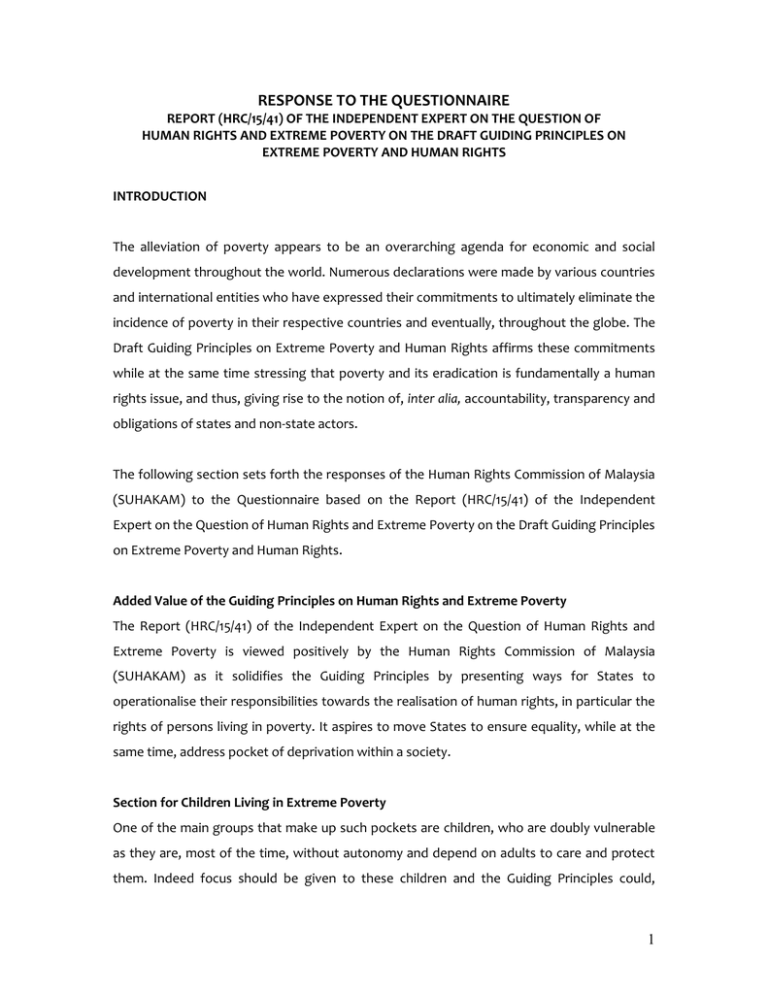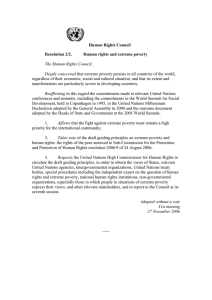RESPONSE TO THE QUESTIONNAIRE
advertisement

RESPONSE TO THE QUESTIONNAIRE REPORT (HRC/15/41) OF THE INDEPENDENT EXPERT ON THE QUESTION OF HUMAN RIGHTS AND EXTREME POVERTY ON THE DRAFT GUIDING PRINCIPLES ON EXTREME POVERTY AND HUMAN RIGHTS INTRODUCTION The alleviation of poverty appears to be an overarching agenda for economic and social development throughout the world. Numerous declarations were made by various countries and international entities who have expressed their commitments to ultimately eliminate the incidence of poverty in their respective countries and eventually, throughout the globe. The Draft Guiding Principles on Extreme Poverty and Human Rights affirms these commitments while at the same time stressing that poverty and its eradication is fundamentally a human rights issue, and thus, giving rise to the notion of, inter alia, accountability, transparency and obligations of states and non-state actors. The following section sets forth the responses of the Human Rights Commission of Malaysia (SUHAKAM) to the Questionnaire based on the Report (HRC/15/41) of the Independent Expert on the Question of Human Rights and Extreme Poverty on the Draft Guiding Principles on Extreme Poverty and Human Rights. Added Value of the Guiding Principles on Human Rights and Extreme Poverty The Report (HRC/15/41) of the Independent Expert on the Question of Human Rights and Extreme Poverty is viewed positively by the Human Rights Commission of Malaysia (SUHAKAM) as it solidifies the Guiding Principles by presenting ways for States to operationalise their responsibilities towards the realisation of human rights, in particular the rights of persons living in poverty. It aspires to move States to ensure equality, while at the same time, address pocket of deprivation within a society. Section for Children Living in Extreme Poverty One of the main groups that make up such pockets are children, who are doubly vulnerable as they are, most of the time, without autonomy and depend on adults to care and protect them. Indeed focus should be given to these children and the Guiding Principles could, 1 therefore, assert State Parties’ existing duties under the Convention on the Rights of the Child considering that it is most widely and rapidly ratified Convention in the world. Additionally, there is the need for countries to part from the one-size-fits all approach to poverty and move towards targeted strategies to reach the poor, including the indigenous community, orphans, persons with disabilities, persons living with HIV and AIDS, the elderly, and undocumented migrants. Feminisation of poverty is an upcoming issue which also requires addressal especially for single women headed households and elderly women. Underlying and Reinforcing Deprivations and Obstacles Faced by Persons Living in Extreme Poverty Besides the underlying and reinforcing deprivations and obstacles as recorded in the HRC/15/41, there is the need for governments to ensure that the implementation of any temporary special measures is only meant to bring disadvantaged or marginalised groups/persons to a level where they are able to enjoy and practice their rights as others.1 Such measures should not be slanted to benefit only racial or certain groups to others’ disadvantage. Additionally, countries should ensure that commitments made to eradicate poverty are translated into action and not merely pragmatic aspirations. Thus, a government that has committed to eradicate income poverty and has set national poverty lines for instance, should not, therefore, allow employers operating in the country to remunerate employees with salary below the poverty line. Others Efforts toward the eradication of poverty remain a permanent agenda of numerous States around the world. However, these are often designed and implemented with the absence of the human rights perspective. Thus, in order to further strengthen the implementation of the principles globally, other countries must be encouraged to ratify the International See Para. 15 of the Report of the Committee on Economic, Social and Cultural Rights’ Thirty-Fourth Session on Substantive Issues Arrising in the Implementation of the ICESCR, General Comment No. 16 (2005). 1 2 Convention on Economic, Social and Cultural Rights (ICESCR). Further, they should be compelled to harmonise the provisions of the ICESCR in their respective legislations. 3

